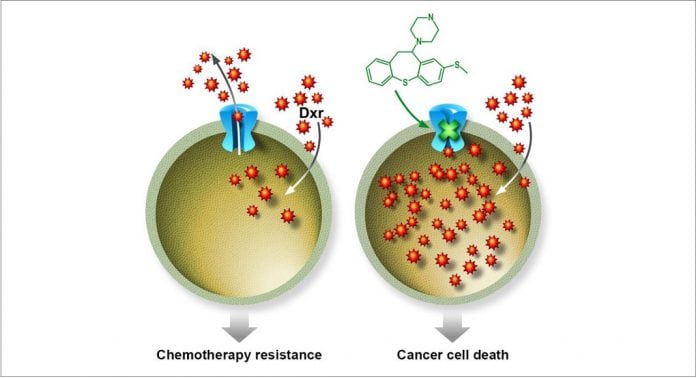
Researchers from the CNRS and Université Nice Sophia Antipolis, France, have demonstrated that methiothepin, a small molecule, can improve the efficiency of chemotherapy by inhibiting the resistance of certain tumours.
Cancerous tumours are also capable of ‘detoxing’, subsequently limiting the efficiency of chemotherapy, and in order to better understand this phenomenon, the research team studied the patched membrane protein, showing that this protein is capable of expelling some of the primary active ingredients of chemotherapy from cancerous cells. The rejection of these toxic substances enables the tumour to eventually survive the treatment.
The patched protein normally participates in embryonic development, but it is diverted as a tool for ‘detoxification’ in numerous cancers, including:
- Melanoma;
- Adrenocortical carcinoma;
- Colorectal cancer; and
- Breast cancer.
Mutated patched proteins have been implicated in a number of cancers, including basal cell carcinoma, medulloblastoma, and rhabdomyosarcoma.
According to the World Health Organization (WHO), cancer is the second leading cause of death globally and accounted for 8.8 million death in 2015. Lung, prostate, colorectal, stomach and liver cancer are the most common types of cancer in men, while breast, colorectal, lung, cervix and stomach cancer are the most common among women.
What did the new research demonstrate?
In the new research, after demonstrating that patched actively contributes to resistance to doxorubicin, one of the medicines used in chemotherapy, the team studied its inhibition through a small molecule called methiothepin.
They found that a combination of doxorubicin and methiothepin eliminates tumours more efficiently than doxorubicin alone, both in vitro on cancerous human cells and in vivo on these same cells grafted in mice.
They were also able to observe that methiothepin fostered the accumulation of the treatment in cancerous cells, as well as its efficiency, and they demonstrated that the combination of two molecules does not increase the quantity of doxorubicin in the hearts of the mice studied, which is an important point, as this compound is known for its cardiotoxicity.
Because methiothepin belongs to a family of serotonin receptor inhibitors, some of whose members are already used to treat schizophrenia, the French research team now wants to pursue this research alongside chemists in an effort to optimise methiothepin and eradicate its effect on the serotonin receptor so as to increase its specificity for patched.
These results of the new study will be on the cover of the July 2018 issue of the International Journal of Cancer.







